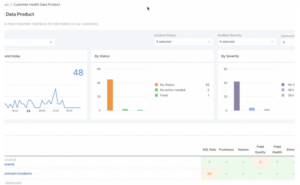
Track Data Product Health and Reliability with Monte Carlo’s Latest Dashboard

Monte Carlo has announced a new capability in its observability suite, the Data Product Dashboard.
The new dashboard gives data teams a window into the health and reliability of the tables, training sets, and other assets powering data products, Monte Carlo says. Monte Carlo says the new Data Product Dashboard allows users to define a data product, track its health, and report on its reliability to stakeholders directly in the company’s observability platform.
Monte Carlo defines data products as applications or assets that deliver trusted information or services to downstream consumers. One example is an airline’s flight tracking system that combines real-time GPS data, flight manifest tables, and historical arrival and departure information to keep travelers informed. (Read Datanami’s deep dive into data products here.)
Jesse Miller, product leader at Monte Carlo, told Datanami that data products are gaining importance in organizations as they bridge the gap between raw data and actionable insights to impact business outcomes.
“With our Data Product Dashboards, Monte Carlo empowers data teams to build trustworthy data products by providing visibility into critical data asset health and reliability. Customers are already using this solution to foster trust, collaboration, and the adoption of reliable data within their organizations,” he said.
 A company blog post penned by Miller describes how data products have emerged as a new and impactful data management framework that can ensure tables, reports, ML models, and other assets are directly tied to tangible business outcomes. But the data feeding these products must be accessible, trustworthy, and performant.
A company blog post penned by Miller describes how data products have emerged as a new and impactful data management framework that can ensure tables, reports, ML models, and other assets are directly tied to tangible business outcomes. But the data feeding these products must be accessible, trustworthy, and performant.
Bad data going downstream has consequences. Data trust is a major hurdle to data product adoption according to a recent Monte Carlo and Wakefield Research survey of data engineers. The survey that showed bad data impacted 31% of revenue, and 74% of respondents reported stakeholders being the first to identify data problems most or all of the time.
To address this issue, Data Product Dashboard allows users to identify which data assets are feeding specific data products, based on tables, reports, dashboards, and models. Users can select relevant tables and their associated assets to define specific data products, thereby keeping everyone aligned on data product definitions, Monte Carlo asserts.
The dashboard also reports on key data health metrics and KPIs over time. These include the number of incidents impacting a given data product, incident status and severity, and monitor coverage for the tables feeding a given product. Additionally, the dashboard allows for data product reliability reporting to downstream stakeholders.

Data Product Dashboard is the latest tool in Monte Carlo’s data observability suite. (Source: Monte Carlo)
The Data Product Dashboard is the newest addition to Monte Carlo’s observability suite. It is joining the Data Reliability Dashboard, released last October, and the Table Health Dashboard, launched in February. Miller says the Data Product Dashboard takes Monte Carlo’s vision for data observability a step further by giving organizations the ability to segment, define, and monitor tables and other upstream assets based on the internal or external data products powering them.
Monte Carlo CEO and Co-founder Barr Moses, one of Datanami’s 2023 People to Watch, said in a statement that as companies ingest larger volumes of data, the opportunity to build impactful and innovative data products exponentially grows. But in order for data products to reach their full potential, data teams must give them the same attention as software applications to ensure accessibility, performance, and reliability.
“Data Product Dashboard is the first solution of its kind to help organizations manage and improve the data quality of the tables and assets powering their most critical data products, and in the process, foster greater trust and collaboration between data teams and their stakeholders,” Moses said.
Related Items:
Monte Carlo Raises $135 Million to Grow Data Observability Biz
In Search of Trustworthy Data Products
How to Build Great Data Products
February 11, 2025
February 10, 2025
- Cisco Study Finds CEOs Fear Falling Behind Without AI Investments
- Bloomberg and Daphne Partner to Streamline Access to Reliable Private Markets Data
- SandboxAQ Expands Alliance with Deloitte to Offer AI Simulation Software Solutions
- DataRobot Acquires Agnostiq to Accelerate Agentic AI Application Development
February 7, 2025
- Palantir Wins Dresner Advisory Services 2024 Application Innovation and Technology Innovation Awards in Multiple Categories
- MOSTLY AI Unveils Open-Source Toolkit for Synthetic Data Generation
- Pecan AI Launches AI-Driven Co-Pilot for Predictive Analytics, Expanding Access to ML
- European Union: First Rules of the Artificial Intelligence Act Are Now Applicable
February 6, 2025
- SoftServe Survey Finds 58 Percent of Leaders Report Using Inaccurate Data
- Oracle Recognized as a Leader in the 2025 IDC MarketScape
- Cognida.ai Secures $15M Series A from Nexus Venture Partners
- TrueFoundry Secures $19 Million Series A Funding to Transform AI Deployment
- Glean Achieves $100M ARR in Three Years
- Moveworks Launches Quick GPT
- Qumulo Announces Cloud Data Fabric File System
- Aerospike Unveils Database 8 with Distributed ACID Transactions for OLTP
February 5, 2025
- OpenTelemetry Is Too Complicated, VictoriaMetrics Says
- The Top 2025 GenAI Predictions, Part 2
- What Are Reasoning Models and Why You Should Care
- Slicing and Dicing the Data Governance Market
- PayPal Feeds the DL Beast with Huge Vault of Fraud Data
- Why Data Lakehouses Are Poised for Major Growth in 2025
- Your APIs are a Security Risk: How to Secure Your Data in an Evolving Digital Landscape
- Inside Nvidia’s New Desktop AI Box, ‘Project DIGITS’
- Top-Down or Bottom-Up Data Model Design: Which is Best?
- Three Data Challenges Leaders Need To Overcome to Successfully Implement AI
- More Features…
- Meet MATA, an AI Research Assistant for Scientific Data
- AI Agent Claims 80% Reduction in Time to Complete Data Tasks
- DataRobot Expands AI Capabilities with Agnostiq Acquisition
- Dataiku Report Predicts Key AI Trends for 2025
- Qlik and dbt Labs Make Big Data Integration Acquisitions
- Bloomberg Survey Reveals Data Challenges for Investment Research
- Collibra Bolsters Position in Fast-Moving AI Governance Field
- Observo AI Raises $15M for Agentic AI-Powered Data Pipelines
- Anaconda’s Commercial Fee Is Paying Off, CEO Says
- Mathematica Helps Crack Zodiac Killer’s Code
- More News In Brief…
- Informatica Reveals Surge in GenAI Investments as Nearly All Data Leaders Race Ahead
- Gartner Predicts 40% of Generative AI Solutions Will Be Multimodal By 2027
- PEAK:AIO Powers AI Data for University of Strathclyde’s MediForge Hub
- DataRobot Acquires Agnostiq to Accelerate Agentic AI Application Development
- Scale Computing’s Edge Computing for In-Store Retail Solutions Showcased at NRF ’25
- dbt Labs Acquires SDF Labs to Elevate SQL Capabilities and Developer Efficiency
- Reltio Is Recognized as Representative Vendor in 2024 Gartner Market Guide for Master Data Management Solutions
- Seagate Unveils IronWolf Pro 24TB Hard Drive for SMBs and Enterprises
- TigerGraph Launches Savanna Cloud Platform to Scale Graph Analytics for AI
- EY and Microsoft Unveil AI Skills Passport to Bridge Workforce AI Training Gap
- More This Just In…



























